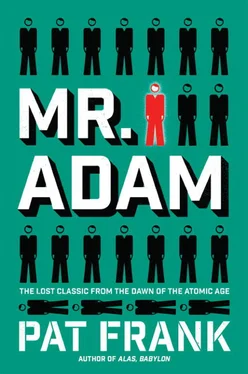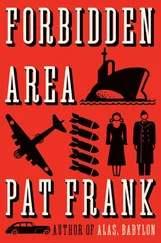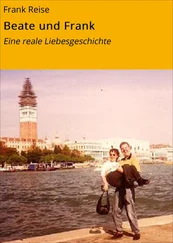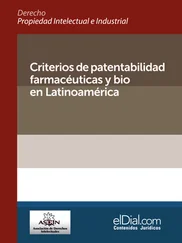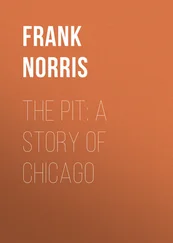Of course we talked about A.I. We played bridge, in the sense that someone dealt cards and we looked at them, but mostly we talked. Except Tommy didn’t talk much. Tommy Thompson was thinking. He did his thinking slowly. When you watched him you could almost hear his brain go click, click, click like an old grandfather clock, just as creaky, and just as right.
“I’ll tell you,” he said finally, “I don’t think the world is going to be permanently sterile. I think there’s a chance for it.”
“You mean through Mr. Adam?” Marge asked.
“Perhaps. He might get it started.”
“What then?”
“Well,” Tommy hesitantly explained, “you know I’ve been experimenting. I’m not entirely satisfied that the male sperm is really dead. I think he is stunned, knocked out, paralyzed, but I’m not sure he is dead. I think I saw one wriggle.”
“When you look through a microscope too long everything wriggles,” said Maria.
“No, I am sure I saw one wriggle.” Tommy looked into his glass, as if he saw one there. “I might as well tell you all about it. I’ve been working eighteen hours a day on this idea of mine. If it is true that the male germ isn’t totally destroyed, then it is just a matter of nursing him back—or jarring him back—into full vitality. I’ve got a compound—”
“Quack!” I interrupted. “Medicine man! Purveyor of snake oil!”
“It is a silly sort of business,” he continued, ignoring me. “It is mostly seaweed. High iodized content.”
“That’s very interesting,” said Maria, suddenly alert. “Why don’t you try it out?”
“I am trying it out. But I need more experimental animals—mostly husbands. How about you, Steve? Some of my colleagues at Polyclinic are taking it.”
“Not me,” I said. “I’m no guinea pig.”
Marge looked at me. “Go ahead and try it,” she urged. “You ought to contribute something to humanity.”
“All over the world,” I replied, “pathologists and biologists and endocrinologists are undoubtedly working, just like Tommy here, on such ideas. Maybe Tommy or one of the others will come up with something. When he does, why naturally I’ll take it. But right at the moment I don’t feel like filling my stomach with seaweed.”
“You’re a big help!” said Marge. “You’re practically a traitor to the human race!”
“If he changes his mind,” Tommy told her, “I’ll give him a bottle of the stuff. It can’t hurt him—at least I don’t think it can hurt him because it hasn’t hurt any of the others. I prescribe forty drops a day, in this test period, and none of the fellows at the hospital are sick yet. On the other hand none of them seem to be starting any babies.”
“He won’t change his mind,” Marge said. “He just doesn’t want to have any children—never has.”
I didn’t argue. What was the sense of arguing? Marge has that damnable type of memory that goes back through the years and picks up evidence that you have long forgotten, and drowns you in it.
I told Maria and Tommy about Homer’s progress, touching lightly on the episode of The Frame, and they agreed that it sounded as if he were greatly improved, and probably on the way to recovery. They promised to come down to Washington and look him over. Perhaps he was in shape for the beginning of A.I., although they couldn’t be sure until they’d given him a thorough checkup.
At nine o’clock we listened to Winchell. He sounded breathless as if he had run up twenty flights in Radio City. He started off with a flash from London. The British Foreign Office had learned, he said, that two unsterilized males had been discovered in Outer Mongolia. They had been discovered several months ago, but the Russians were keeping it a secret. It seems that they were miners, and like Adam they had been in the lowest level of a deep lead workings when Mississippi blew up.
“That’s very interesting,” Tommy said. “I wonder if it’s true?”
“It sounds plausible,” said Maria.
“I don’t think so,” I said. “It isn’t very likely that the British Foreign Office would know what goes on in Outer Mongolia. There probably have been some rumors floating around, and finally the rumors reached London, and the Foreign Office allowed them to leak, just to sound out the Russians as to whether they were true.”
“If it is true, what effect would that have on the N.R.P.?” Marge asked.
“Oh, I think it would start a production race between us and the Russians. And there would be a lot of pressure to utilize Adam immediately. I’m glad he’s better, because even the hint of an unsterilized Russian is likely to send Washington spinning.”
“It is sort of frightening,” Marge said. “Those Mongols breed like mice, don’t they?”
“All things considered,” Tommy said, “I think a good husky Mongol would outbreed Adam three to one, from what I have seen of him.”
“That’s probably true,” said Maria, “but if we’re able to perfect improved methods of A.I. utilizing a single germ for each impregnation—which as you know is what I’ve been working on—why we can meet their competition. However, they’re just as advanced as we are in those things and if they have two men to our one, and a bigger population to work with, why I suppose they can keep their birth rate well above ours.”
I said it was all hypothetical anyway, until something definite was known, and if it was true then that was good, because then both countries would get together and pool their knowledge and perhaps save the human race after all. Maria said she didn’t think it would work out that way, because all her experiments were viewed as military secrets, and she supposed it was the same with the Russians.
I explained about military secrets, so far as I knew. It seems that every major power has two operations, one called S.I.—Secret Intelligence—and the other C.I.—Counter Intelligence. “Now that this is peacetime,” I said, “ordinarily those guys would be back in their normal occupations as purveyors of buggy whips, peddlers of brushes, operators of shooting galleries, and clam and oyster salesmen. But a secret agent makes a lot of money and he doesn’t have to account for it. In every country in the world it is called ‘unvouchered funds,’ and a secret agent supposedly pays out these unvouchered funds to people for information.”
“It sounds very profitable,” Marge agreed.
“Oh, it is. It is a wonderful racket. It is sort of an international club. All the fellows in S.I. try to penetrate other countries, and all the fellows in C.I. try to keep other countries from penetrating us.”
“We have very nice counter-intelligence men,” Maria objected. “They come to see me all the time. They put up baskets in our laboratories, and we are supposed to throw all our notes in them, and then they come around and burn the baskets. It is just like collecting the garbage, only cleaner.”
“Is that all they do?” asked Marge.
“Oh, no. They make you sign papers.”
“The British,” I explained, “are wise to the racket, and they do it better. Most of the men in the British Secret Service have to hold other jobs too. In that way the government gets some work out of them. It is also a very good cover, because it is an honest cover. We aren’t that smart. A guy turns up in a place like Istanbul and claims to be a reporter for Field and Stream , or Vogue , and everyone knows it is a phoney cover, but nobody says anything about it, because it would hurt the racket generally.”
The telephone rang. It was Jane, in Washington. The N.R.P. was boiling, she said. Everybody was excited about the news from Outer Mongolia. Both Gableman and Mr. Pumphrey had called, and they wanted me to return to Washington immediately. There was to be a special conference with the State Department at ten in the morning, and the Planning Board would meet at eleven, and at noon Mr. Pumphrey would call at the White House. “But is it true about this Outer Mongolian business?” I asked.
Читать дальше
